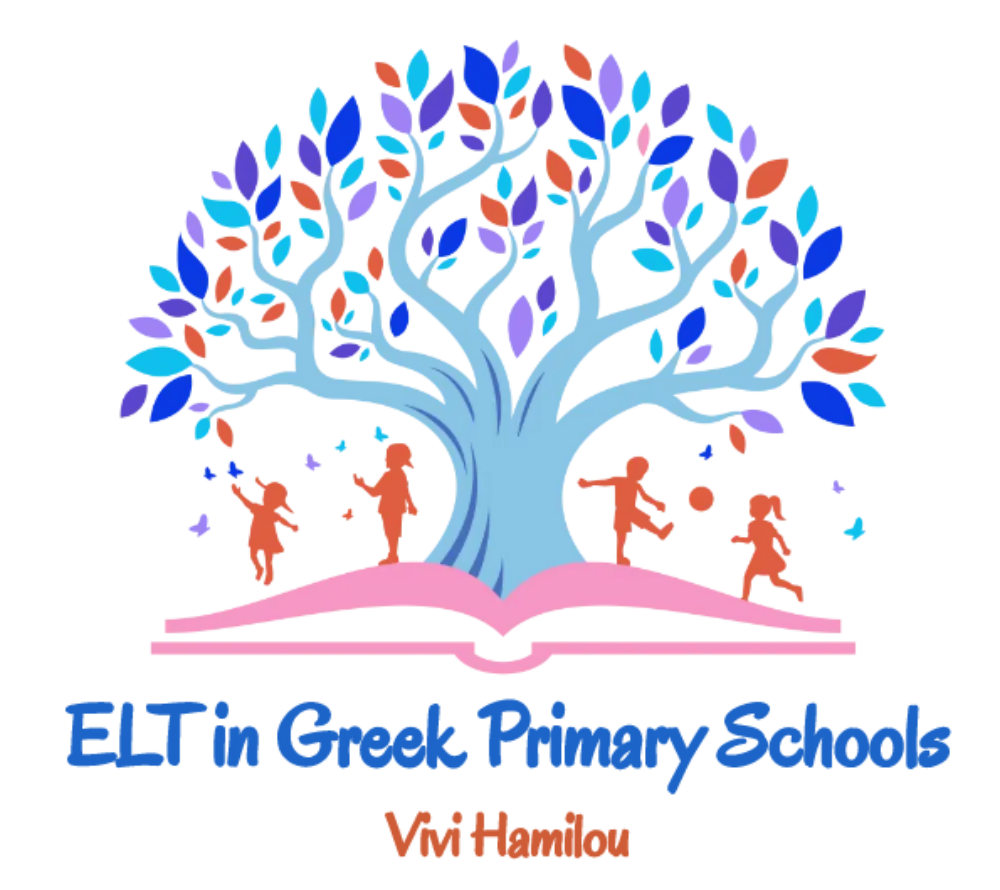Easter games, activities, information, quizzes, cooking and crafting, all in one place! If this is what you’ve been looking for for your learners, feel free to use it!
Tag: 6th grade
WRITING A REPORT ON “MY COUNTRY” WITH A REAL-LIFE PURPOSE
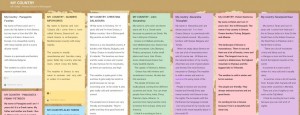
The course book we use at the 6th Grade in Greek Public Primary Schools invites learners to write a report on their country at the end of the first unit. My 6th graders and I proudly present our electronic (padlet) wall with our reports that have been written with a real-life purpose: to be published on our school blog!
Please, feel free to leave comments under our reports, click on the hearts if you like them and/or invite your learners to read and comment on them, too (if you are a teacher, of course!), so that we know that other people out there can actually access them and read them! Thank you in advance for your time and … enjoy!
VOCABULARY LEARNING: CAN IT BE FUN?
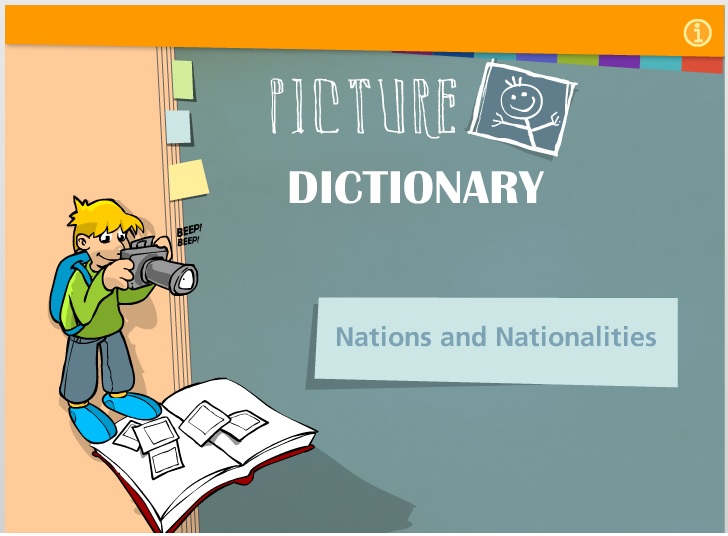
Vocabulary learning is a significant part of language learning. The more words a student learns, the better s/he becomes at receptive (reading and listening) as well as productive (writing and speaking) skills in the target language!
Every learner has his/her own way of studying/learning/consolidating new vocabulary. If you travel back to the times when you were a learner, you will definitely find you or your fellow classmates writing words in notebooks, making your own dictionaries with new words and their definitions, repeating words in an attempt to memorize them, or grouping them based on their meaning. And, no matter which strategy you followed back then, almost all of them leave you with a sense of dullness, exhaustion and/or vainness.
Nowadays, learners have the opportunity to work with new vocabulary in many more interesting ways, provided that they are willing to devote some time, have access to a computer with internet connection and are introduced to the right sites to refer to in order to pursue vocabulary enrichment. This year, at the Primary School of Efxeinoupoli, Magnesia, Greece, we are trying to make vocabulary learning and revision a bit more fun, by exploiting the Digital School and Photodendro! Learners will be introduced to specific links suggested by the enriched version of the digital school book and found at the digital educational repository called Photodendro.
Having, for instance, introduced the very first pages of the Unit 1 in the 5th and 6th grades, learners now have the opportunity to visit the school blog and practice with different vocabulary tasks related to the lessons we had in the aforementioned classes. To be more precise, 5th graders are invited to practice email reading and writing, and vocabulary related to computer parts, whereas 6th graders have the opportunity to revise countries and nationalities, as well as flags and Geography!
All of my 5th and 6th grade learners promised to work on these tasks as they were intrigued when they were presented with their content today and they said they would have plenty of time to devote over the weekend! And, although it is too soon to tell how this whole effort goes, their wide open, sparkling eyes tell me that vocabulary learning and revision may become indeed more fascinating and effective!
Have a great weekend, everyone! 😉
THE FLIPPED CLASSROOM – LESSON 2 – A Midsummer Night’s Dream
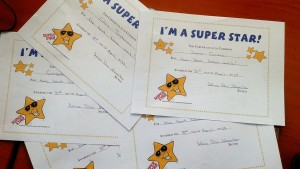
We have started with the intention to shake up things a bit in the English classroom and we did, with the first flipped lesson in an attempt to teach the degrees of adjectives! After the second (and final, as we had initially planned) flipped lesson, all I can tell you is that this experience has to be repeated, primarily for my learners and, definitely, for their English teacher!
The second lesson was delivered at the learners’ home, by means of a video that the learners enjoyed while completing a worksheet. You can see the related school blog post they had to visit here! The video had nothing to do with grammar, this time, so, when the 6th grade learners heard it was a comic based on Shakespeare’s play “A Midsummer Night’s Dream”, they could not wait to go home and watch it!
https://www.youtube.com/watch?v=PcnJ_dUwpRY
When they were given the worksheet with instructions to complete it while watching the video, they were not particularly excited, but when they took the time to see what they were invited to do, they encouraged each other to watch the video and fill in the worksheet, given that they would all want to contribute to their group of work during the next session and they would all go after the award for the best team work in class!

Coming back in the classroom after watching the video at home, five of my fourteen learners had been absent, owing to this terrible flu that has been torturing many children and adults lately! We tried to postpone the lesson, but three days later, five other learners had been absent, so, unfortunately, we had the lesson without them! They all claimed to have watched the video and, what followed, really proved them honest! Learners were separated into two groups, that very quickly ended up being three, given that some learners thought they would work better if they were in a smaller group! First, they checked their worksheets and negotiated the correct answers with the members of their group! I wish I had that on a video … They were speaking English without realizing it, they were helping each other understand why something was incorrect or misunderstood, they were encouraging and supportive and they were not judging or criticizing others for making mistakes! The teacher was only restricted to monitoring (while actually feeling unbelievably proud of her learners!) and taking pictures of the process.
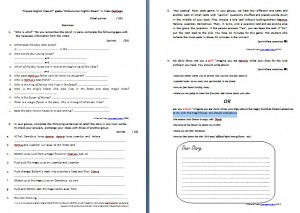
When we all checked the video worksheet, learners were given another one that has been designed for in-classroom use. The first task invited them to answer questions related to the play/comic they had watched. Although there was concern that they would not find it very challenging, in reality they seemed very engaged to do it, involving all the group members. It took them a bit more than expected, but the result was really rewarding for everyone! During the second task they were invited to complete sentences related to the play/comic they had watched. Once again, they were really dedicated to finishing the task and passionately negotiating the correct sentences! Unfortunately, we did not manage to finish the task in that teaching session, so we had to finish it on our next lesson.
And we actually did! At the beginning of the following session, the learners came in with excitement, joined their groups without being told to and started working almost immediately! It is worth noting that no one had forgotten their photocopy and some of them had already worked a bit at home, without writing anything on their worksheet, waiting for the approval of the whole group. When they finished this task, we played the “Hot seating” role cards game, but, because of the lack of time, we had to adapt the procedure in order to finish it in time: one learner in each group was sitting on the ‘hot seat’, assuming one of the roles of the play and not telling his classmates which one! They were asked to find out who the person on the ‘hot seat’ was by asking questions! The one who would find the correct answer had to sit on the ‘hot seat’ and continue the game! It was quick, it was engaging and it was fun! Finally, the last writing task was assigned for homework-everybody who attended the lesson actually brought it completed the next day!
I can almost hear you thinking … “Is this for real?” Well, I swear that this one was and I feel so lucky to have tried it! However, it should be noted that no one can guarantee that flipping the classroom will work equally successfully at lower levels, or same level but less competent learners, or more crowded classes! Whatever the challenge, though, a well-designed flipped lesson is more likely to shake things up a bit in class and have your learners begging you for more! We actually finished the second flipped lesson on Monday and today, only two days later, they asked me when we are going to flip it again! I did not give them a straight answer, but I know that we are flipping it again some time after Easter, because I loved the look on my learners’ faces and the frequency of the in-class oral and written production of the target language and appreciated the role of the coordinator, who monitors the whole process in a purely student-centered approach! Once again, thank you Ms Andriani Rigoutsou for this eye-opening experience, congratulations on your exceptional work on the materials and good luck with your dissertation! Looking forward to cooperating with you again!
THE FLIPPED CLASSROOM – LESSON 1 – DEGREES OF ADJECTIVES
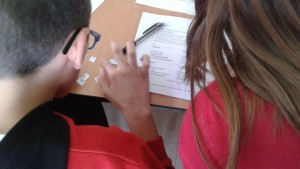
I wish there were words to describe the look on everybody’s faces today (including mine!) during the in-class activities of our first flipped classroom lesson (you can see here how it all started!)! If the word satisfaction had a picture right next to it in the dictionary, then, that would definitely be one of my learners’ and my expression after our English lesson today! And, although I know that statements of this kind are not academically acceptable or customary, please, dear colleagues, allow me to share my enthusiasm with you as I have been feeling it since a quarter past one today!
Yes, it was the last teaching session of the day and, yes, it had to be with the 6th graders! Yes, they had all watched the videos and, yes, they had all tried the recommended interactive tasks included at their school blog post(or at least they said they had!). Yes, we started working in three teams and, yes, none of us knew at the time how the pre-designed in-class activities would work either individually, or in terms of groups!
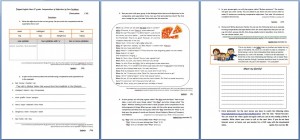
After separating the learners in three groups and promising to award the one that will demonstrate the most exceptional team work, we started with the first task that involved learners in grouping the adjectives based on the way they form their comparative and superlative degree. This task seemed to be an appropriate warm-up and an initial opportunity for the teacher to monitor and evaluate the level of comprehension of the new grammatical structure the learners had learnt about through the videos they watched at home! The specific task appeared to be easy for everyone, we checked the answers and moved straight to sentence-making in the second task! In approximately five to six minutes, learners managed to complete this task, involving everyone in the group and negotiating the correct sentences in an admirably cooperative manner! After that, task three and underlining the comparative and superlative forms of adjectives seemed like a treat, especially for those who normally show unwillingness or hesitation to participate while checking the correct answers! Everybody seems to be clear on how to form the degrees of adjectives and everyone appears to be capable of making sentences using them meaningfully. And, when I say everyone, I really mean everyone!
Later on, it was games time! Task four and “Plip” and “Plop” sentences really took everybody off to the level of learning while having fun! Groups agreed on the sentences they would say and the fun began right after that, trying to find out what “Plip” and “Plop” were! Finally, “The Broken Sentences” game will be the task we will all remember for a long, long time! As we were moving towards the end of the lesson and there had to be some time left for homework assignment (and explanation!), I gave them a challenge, saying that the fastest team to get the sentences right would earn extra points for the best team work award! The level of engagement, the constant reminding among group members of the grammatical rules to be followed, the unprecedented level of cooperation, support and encouragement are, unfortunately, for us to know and appreciate and you to imagine!
So, was the inverted lesson a big success? No, it was huge, I’d say, and learners commented so possitively on that as soon as the bell rang and they started packing their things for home! They all participated, they all got involved, they all raised their hands to contribute, they all appreciated the work of their team members and, what is more, they all stated that they did not realize that time went by so quickly and that they want a flipped lesson again some time soon! As for the teacher, she was only restrained to monitoring and coordinating groups, while evaluating the level of perception of the new grammar by the learners (given that the materials had already been designed, photocopied and cut for the tasks and games!)! Although it seemed very easy and discrete to intervene and help a learner in need, that was at no point necessary, as team members would step up and support their peers.
It is worth noting, however, that the particular class had also been taught the degrees of adjectives in the 5th grade and most of them have had a lot of practice in them in their afternoon English lessons in private language schools, so they were quite comfortable with the form and use. This allowed us to move from task to task relatively quickly and the time/award challenge seems to have ‘spiced’ a lot the procedure! Had the video lessons been confusing or incomprehensible for some learners, the pre-designed in-class activities would more likely last for at least two teaching sessions.

All in all, my learners and I cannot wait for the next flipped lesson, as it was a unique learning and teaching experience! A million thanks to Ms Andriani Rigoutsou for doing all this hard, time-consuming and demanding work that had always been dragging me away from trying the flipped classroom (meaning collecting the videos and online interactive games, as well as designing and preparing the in-class activities/worksheets), but, most of all, thank you for inspiring us and making us part of a a very supportive and cooperative group of colleagues and classes that share with us the same concerns and interests in new teaching approaches!
POEMS ON OUR FAVOURITE THINGS – 6th Grade
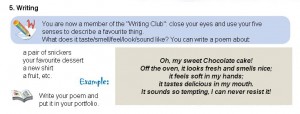
6th graders at the Primary School of Sourpi are writing poems on their favourite things! They were initially shocked to be assigned with this kind of homework, but they came with shiny, happy faces the other day to show me their work! I told them that their work is too awesome to be kept and enjoyed in class! So, here we are, sharing it with the world, on a padlet wall they have typed themselves! Well done, guys!
POEMS ON OUR FAVOURITE THINGS
Who said Primary School learners are too young to write poems in English? Well, not us at the Primary School of Sourpi! Our 6th grade learners have written poems on their favourite things in English! Check them out here:
FUNNY “WANTED” POSTERS
Our 6th grade learners at the Primary School of Sourpi are imaginative, creative and have a great sense of humour! Here are their funny “WANTED” posters! Have you seen any of these creatures wandering around???
Art Exhibition – The fall of Icarus – Primary School of Pteleos, Greece
Our 6th grade English coursebook introduces – or, even better, brings back to our memory – the myth of Daedalus and Icarus (Unit 4).
On p. 46, learners are invited to make their own painting of the fall of Icarus, having first commented on Pieter Brueghel’s painted landscape with the fall of Icarus, which was created in 1558 (oil on canvas, Musées Royaux des Beaux-arts de Belgique, Brussels), as well as a related poem.
Here are our learners’ pieces of art (Primary School of Pteleos)!
@E.F.E. Team
@E.F.E. Team is the name of a blog I recently (and fortunately I may add!) found on a late night research. It is related to the English materials Greek public schools use in the 6th grade and the writers of this blog are the actual writers of the coursebook itself (E.F.E. actually stands for Eleni Efremidou, Filitsa Frouzaki and Eleni-Zoe Reppa, that is the first letter of the first name of every writer)! There is plenty of information regarding the 6th grade English materials, suggestions and resources for teachers (lesson plans, tests, etc), interesting links and articles. Hope you find it as enlightening and as useful as I did!
